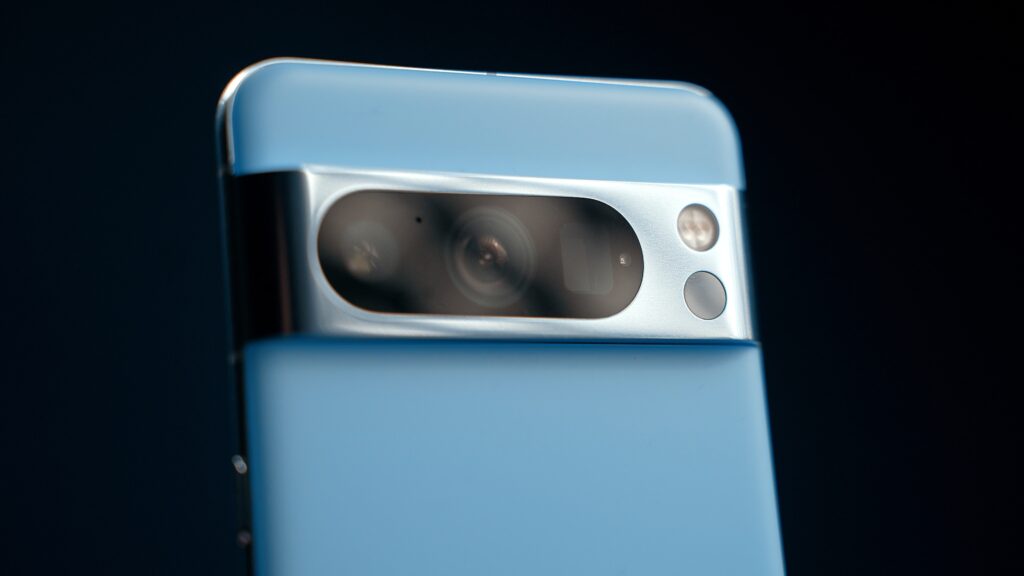Google announced its new AI model, Gemini, on December 6. From now on, the Pixel 8 Pro is entitled to it. Enough to make your photos and videos foolproof, and save you even more time.
We said it at the beginning of October, during the presentation of the Pixel 8 and Pixel 8 Pro: Google’s new range of smartphones is the first in the era of artificial intelligence. The December 6 announcement from the American company further reinforces this impression: the future of the Pixel will be written with AI, and Gemini will allow it to take a further step forward.
Designed in-house by the Mountain View firm, Gemini is a brand new model of automatic language processing. It was developed so that Google could get back into the race against the inevitable ChatGPT from OpenAI (which uses the GPT-4 model). According to Google, it does more than that: it outperforms ChatGPT in several evaluation criteria.
And the group is determined to deploy Gemini everywhere.
Gemini rolls out in Pixel 8 Pro
Everywhere, with priority for deployment on its most high-end smartphone in 2023 (read our review of the Google Pixel 8 Pro). Google has planned a special version of its new artificial intelligence model, so that it can work in a phone — which has obvious limitations in terms of computing capacity and battery life.
This model is called Gemini Nano (the other two are Gemini Pro and Gemini Ultra). It is the smallest in size, but it is suitable for mobile, offline use, without using the group’s servers. On the Pixel 8 Pro, which is the phone primarily served by Google as part of the Gemini Nano deployment, it will be based on the Tensor G3 chip.
The arrival of Gemini Nano on the Pixel 8 Pro is effective from December 6. According to Google, this association between the AI model and the Tensor G3 chip allows new usage options. In particular, there is a “Summarize” function in the Recorder app and another that provides “suggested answers” in the Gboard app.

The descriptions of both functions say exactly what they do: the first synthesizes recorded conversations, interviews, presentations and more, to get to the point. The second imagines responses based on the messages you receive – which Gemini Nano must necessarily read, to understand their content. Again, to save time.
It works with WhatsApp, an application very widely used around the world – more than 2 billion members according to messaging, a subsidiary of Meta (Facebook). However, not everyone will have access to this option: you must, in fact, own the Pixel 8 Pro. Other messaging apps are also expected to be supported in 2024, according to Google.
Better photos and videos on the Pixel
Gemini’s capabilities also extend to the field of photography and video. Among the faculties announced:
- automatically recalibrated videos. A “Video Boost” option adjusts color, lighting, stabilization and grain. However, this is done through Google’s servers, which must retrieve the video to screen it through its image processing algorithms.
- better management of videos taken at night or in low light. This “Night Sight” option is used to reduce the noise of videos recorded in this case, to bring out more details and color.
- nighttime timelapses: time-lapse videos taken with the Pixel 8 and 8 Pro to better capture nighttime lights over a long period of time.
- better lighting with portrait mode. Here again, AI is called upon to “balance the lighting in order to easily remove overly strong shadows and improve portrait photos, whether recent or old,” says the Mountain View firm.
- better anti-blur to obtain sharper shots, even if the subject being photographed tends to move.
Other features should also be noted: the tool for cleaning papers and scanned documents is improving, to digitally remove stains and dirt visible on the screen. The details are given on the Google blog. Some of the new features are aimed at everyone, the rest depends on the type of smartphone you have.


Subscribe for free to Artificielles, our newsletter on AI, designed by AIs, verified by Numerama!
